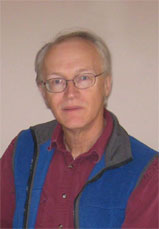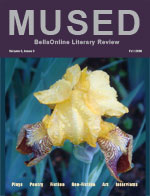Lee Evans
In His Own Words
THE FOOTPRINTS OF A POET

Meister Eckhart once said in a sermon: "...if Life were questioned a thousand years and asked: 'Why live?' and if there were an answer, it could be no more than this: 'I live only to live!'" And I think that this is an appropriate enough start to an account of myself as a poet. "Why write poetry?" you may ask me. And the answer is, "I write only to write!"
Swooning down the sky
Beyond the Demolition Derby:
Transcendent sunset
I feel the urge to write as a tightrope walker feels the urge to balance himself, or a botanist to study plant life. In Swedenborg's version of Heaven, the angels live in an eternal present in which each has a vocation that expresses the Divine Wisdom. To the extent that I am absorbed in writing a poem, I feel that I am doing the work I am born to do. Yet I know all the while that it is necessary to leave the best unsaid.
Sometimes a poem just writes itself, and I leave it without revision. More often than not, I rework a poem, try it out in various forms, until it no longer resembles its first draft. Revision can be a process of discovery. I've often not known what it was I wanted to express until I worked it out by muddling through twenty or so versions. I wrote "The Butterfly Garden" during commercial breaks while watching Jack Nicholson and Michelle Pfeiffer in "Wolf." The mind works on several levels at once.
I wrote "Inside Out" while I was doodling on a piece of scrap paper, then stuck it inside a dictionary, where it remained for twenty or so years. Every now and then I would come across it, read it, and postpone my judgment as to its worth. One day it revealed itself to me, and I finally appreciated it and sent it to Mused, where it was published:
Outside my window
rhododendrons blooming;
bees browsing busily;
unseen distant lawnmower's music
merging with the airplane
that drowns birds' sounds.
Last night outside my window
as I lay sleeping,
two trees were struck by lightning--
but my dreams were undisturbed.
Grass ankle deep
and covered with dew,
each drop reflecting dreams
of universes old and new.
I confess I don't know much about the rules and forms of poetry. I once picked up a book in which the characteristics of sonnets were expounded, and I could scarcely follow the discussion. Yet I have composed and published not a few sonnets. The best poetry comes from having something of substance to communicate; then the flesh, as it were, takes on the form of the spirit: for every spirit strives to take on form. A great deal of my poetry is formal; but form itself is quite ineffectual when it subordinates content.
I once wrote a poem in free verse, the subject matter being the vitreous floaters that have distracted me for the past thirty or so years. It was about a page long, and used the floaters to illustrate the presence of conditioned compounds which can be resolved into ultimate entities according to Buddhist Abhidhamma philosophy. You might say that this effort put too much of a strain on the poem's aesthetic qualities. After a few years I was seized by the idea that it could be converted into a sonnet, and in doing so I dropped the Abhidhamma for more subtle insinuations. In fourteen lines I condensed the images of the eyeball, the floaters, and the snowflakes in a glass paper weight containing a winter landscape, into a much more satisfactory and successful expression. In fact, I managed to transform into a poem a piece of writing that was really only rambling prose. You will have to take my word for this, for I have no intention of producing the original.
Poetry covers the range of human life, which includes the spiritual as well as the physical; politics as well as private experiences; philosophy as well as aesthetics. It was not only Hell that figured into Dante's Commedia: the Beatific Vision was the poem's climax: and between the polar opposites of Heaven and Hell the whole known universe was encompassed. I am no Dante; but I am a microcosm, as is each one of us. Everything that a poem expresses should take its place in a perspective that reveals something of the nature of the universe. A poet who writes with this realization will have no problem casting his work into appropriate forms, regardless of his knowledge of what scholars consider important.
In a word, I am saying that inspiration and metaphysical insight are essential to poetry. But also a kind of "human heartedness" is just as necessary:
In a tiny urn
That dangles on her necklace-
Her husband's ashes.
I cannot write anything consciously. Well, consciousness is there, but it flows from beyond itself. This is not an idiosyncrasy- it is the human condition. We cannot do anything of ourselves. It is almost like the teaching of the Tao: those who speak do not know, those who know do not speak. The more one writes the more one goes astray. One should resist the urge to write until it is irresistible; it is irresistible when one finds oneself writing as unconsciously as one breathes or digests food. I do not know how I have managed to compose my best poems; as for my worst ones, I know only too well. Too much consciousness can ruin anything, not just poetry.
"Grasshopper Cages" is really about myself. When I wrote it I remembered myself as a child, sitting in the grass on a sunny summer's day, playing with the plantains. I wrote it intermittently over a few years; it is, I think, the kind of poem that can never be finished, for it indicates that life itself cannot be bound to our preconceptions.
I do not put much stock in autobiography; I have given up trying to produce a life story that makes sense to me and my readers. You can understand my life only in the light of yours. I leave blank spaces between my words, and you, the reader, have to fill in those blanks with your own insights and experiences. We are the co-creators of my poems.
The poet attains the virtue of humility when he realizes that what he does is not the Alpha and Omega, but only the iota, without the capital "I." Where does all this lead, and how does it end? One goes on and on creating, because one is continually being created. There is only one Poet, and one perfect poem; all the rest are defective imitations. When I am at my best, I renounce delusions of originality. Let me conclude on this note:
I am a story,
I am a work of fiction,
Seeking to be true-
Subject to reality,
And my Editor's approval.

